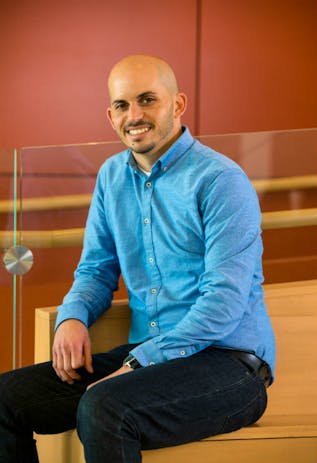OUR Nurses: Sergio Amador Perez Follows His American Dream
By Nora Williamson
Tuesday, January 17, 2017
Sergio Amador Perez can’t pinpoint when he began thinking about leaving his home country of Cuba and moving to the United States.
“I wanted to come here for a very long time — since I can remember,” he said. “The opportunity of freedom, being able to say whatever you want, the freedom of religion…it’s pretty much the opposite of what I experienced in Cuba.”
Perez grew up in Havana in the 1990's, after the collapse of the Soviet Union and during one of the most crippling economic crises Cuba has experienced.
“There were 12-hour blackouts when the government was trying to conserve power,” he said. “There wasn’t much food to go around, and I remember when I was 9 or 10 years old, walking blocks and blocks to fill up containers of water for my family.”
Despite the hardships he encountered, Perez’s mother and grandmother helped him make the most out of his childhood. His mom, a teacher, encouraged him to study, and he received high grades that allowed him to get into medical school.
After graduating as a physician, completing a residency, and beginning to treat patients, Perez received his visa as part of a program that offers American residency to Cuban medical professionals. The U.S. government gave him the choice of three cities to live in: Phoenix, Albuquerque, and Rochester.
“I knew the winters were going to be tough, but I wanted to live in Rochester because I knew it would force me to become fluent in English. If I chose one of the other two cities, I could get by speaking Spanish,” said Perez.
When he arrived in the U.S. in 2011, he focused his efforts on learning English and volunteered in several doctor’s offices so he could practice the language.
“I didn’t immediately know whether I wanted to go through the process to be able to practice as a doctor in the United States,” said Perez. “But after volunteering, I knew that nursing was a better fit. I wanted to have a closer relationship with my patients and have more time to spend with them.”
Perez enrolled in the school’s accelerated program in May. After graduating in 2017, he will enter the family nurse practitioner program with a goal to work with Hispanic patients and address many of the health disparities within the population.
He also hopes to earn U.S. citizenship — an accomplishment that will allow him to bring his mother to Rochester to visit. Although they’ve been apart for five years, the lessons she taught him have followed him to his new home.
“She always told me that you don’t know what your path is going to be, and to open to any opportunities,” said Perez. “I’m really glad that I listened to her.”
This story was originally featured in theFall 2016 NURSING magazine.
Categories: Nurse Practitioner Programs, Accelerated Programs

